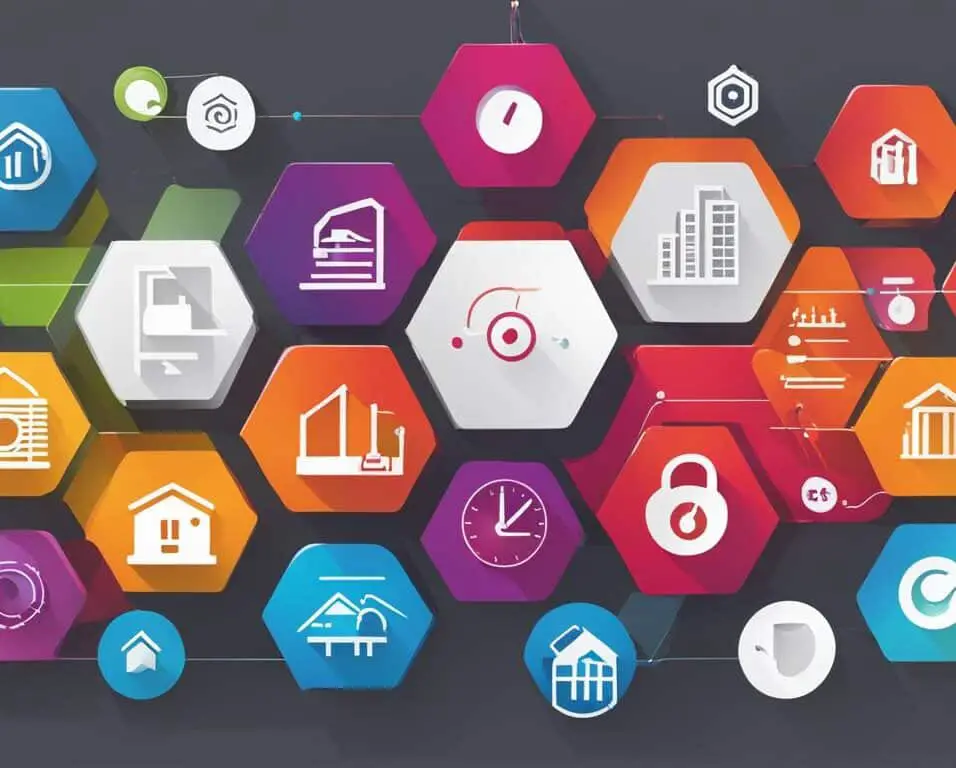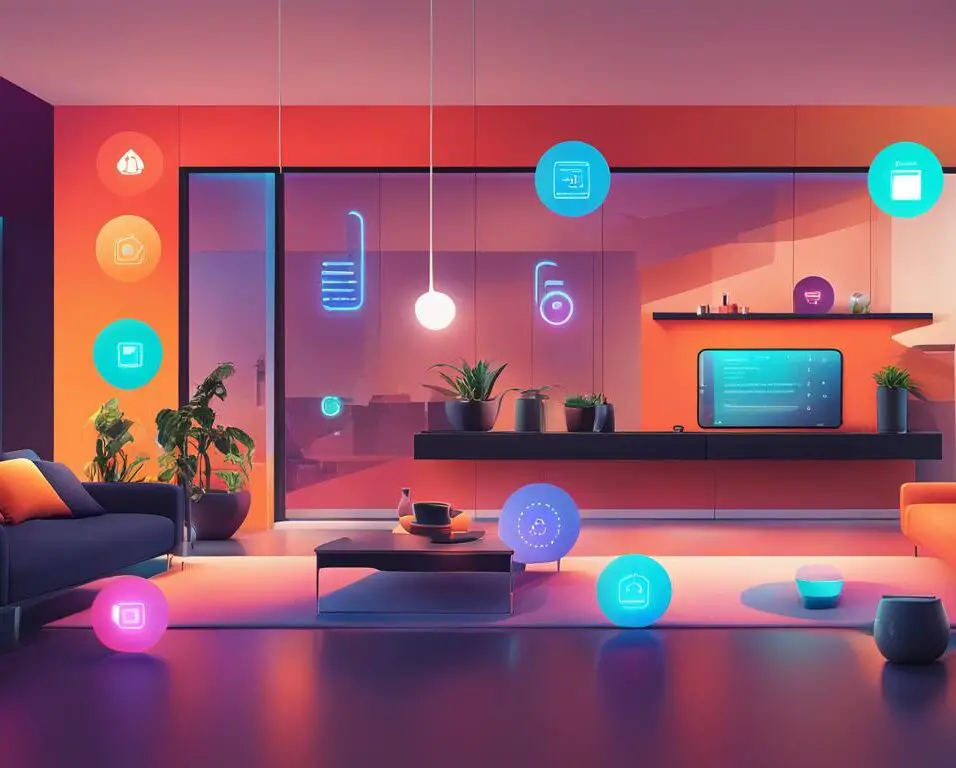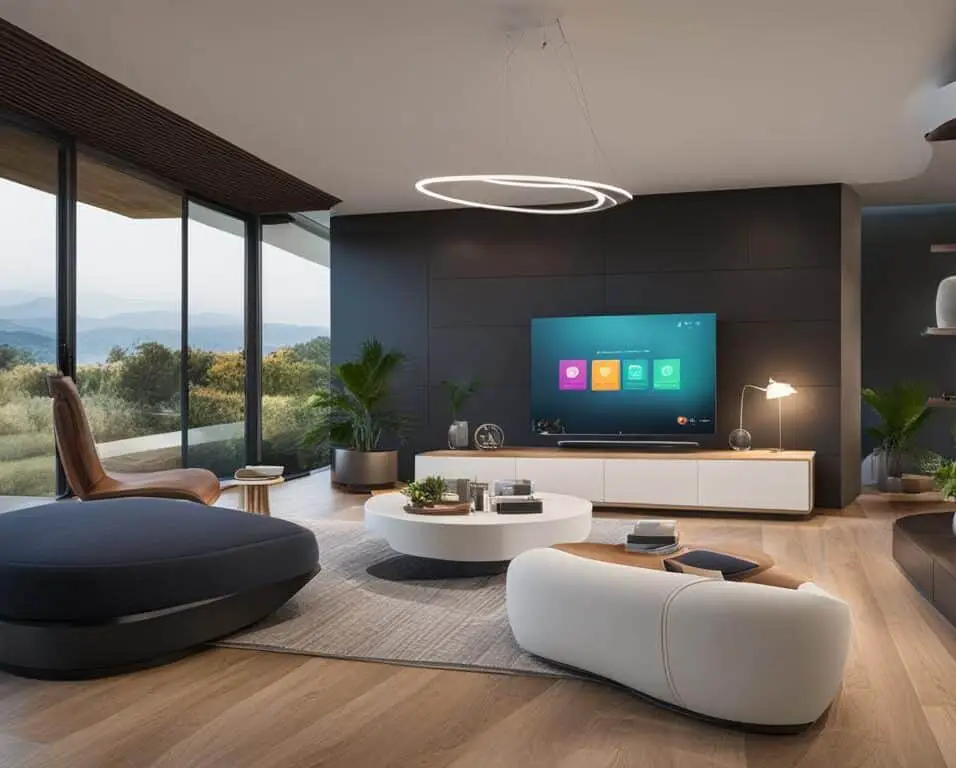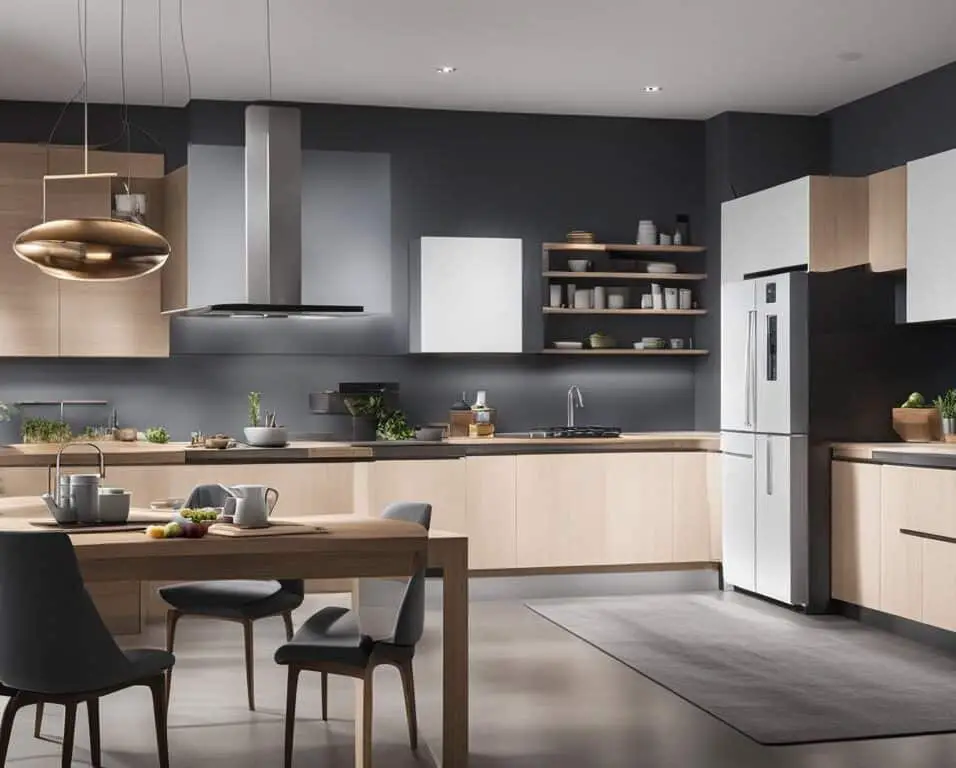Unveiling AI’s Potential in Home Automation
Smart home automation powered by AI is revolutionizing the way we live. This rapidly developing field combines traditional luxury with cutting-edge technology, providing us with unprecedented levels of convenience, efficiency, and peace of mind. From improved access control to energy-efficient solutions, AI-driven insights are reshaping the smart home landscape. In this article, we will explore the advantages of AI-powered smart home automation and its impact on our daily lives, as well as discuss the future trends and possibilities.
Key Takeaways:
- AI-powered smart home automation enhances access control, energy efficiency, and user experience.
- Smart home technology allows appliances to operate independently and be controlled remotely through a shared network.
- The integration of AI with smart home appliances is driving the rapid growth of the global smart home automation market.
- Unique AI-powered technologies, such as smart mirrors, robotic chef assistants, and smart controllers for pets and plants, showcase the potential of AI in home automation.
- AI is revolutionizing smart homes by enabling voice-activated assistants, adaptive appliances, and proactive security systems.
Advantages of Smart Home Automation
Smart home technology has revolutionized our living spaces, offering a seamless integration of convenience and efficiency. With the power of AI, these automated systems enhance user experience and provide a heightened level of smart access control, home security, and energy efficiency. Let’s explore the key advantages that AI-powered smart home automation brings to our lives.
Improved Smart Access Control and Home Security
One of the significant benefits of smart home automation is the enhanced smart access control and home security it provides. With biometric authentication techniques, such as fingerprint scans or facial recognition, AI-powered systems ensure that only authorized individuals can access your home. This advanced security feature offers peace of mind and protects against unauthorized entries, deterring potential intruders. Additionally, smart AI-enabled security cameras provide real-time monitoring with instant alerts, enabling proactive surveillance and alerting homeowners to any suspicious activity.
Energy Efficiency and Sustainability
AI-powered smart home systems contribute to energy efficiency and sustainability by adapting settings in real time. These intelligent systems analyze data from sensors and algorithms to adjust lighting, heating, cooling, and other appliances based on usage patterns and occupancy. By optimizing energy consumption, smart home automation reduces waste and lowers utility bills. For example, AI can automatically adjust thermostat settings to conserve energy when no one is home and restore comfort levels before residents return. This energy-saving feature not only reduces environmental impact but also contributes to substantial long-term cost savings.
Enhanced User Experience and Convenience
AI integration in smart home automation creates an enhanced user experience through personalized automation routines and seamless connectivity. Using voice-activated assistants, such as Amazon Alexa or Google Assistant, homeowners can effortlessly control various aspects of their smart homes, such as adjusting lighting, playing music, or setting schedules. AI-powered systems also learn user preferences over time, adapting to their unique needs and automatically adjusting settings to provide optimal comfort and convenience. For example, smart appliances can remember preferred temperature settings, water levels, or cooking times, creating a personalized and hassle-free living experience.
“AI-powered smart home automation provides a heightened level of smart access control, home security, energy efficiency, and enhanced user experience.”
The Advantages of Smart Home Automation:
- Improved smart access control and home security through advanced biometric authentication techniques.
- Energy-efficient operations and reduced environmental impact with real-time adjustments based on occupancy and usage patterns.
- Enhanced user experience and convenience through personalized automation routines and connectivity.
AI’s Impact on the Smart Home Landscape
The integration of AI with smart products is revolutionizing the global smart home automation market. A recent study by Grand View Research, Inc. predicts an outstanding annual growth rate of 27.3% from 2023 to 2030.
This growth is largely attributed to the crucial role played by AI in enhancing smart home automation. With AI, homeowners can enjoy customized automation routines tailored to their preferences, optimizing energy consumption and anticipating daily needs. As a result, AI-driven smart homes offer unparalleled convenience and efficiency.
Moreover, the integration of AI with smart home appliances aligns with the current trend observed among technology giants and key sectors. This integration allows for seamless connectivity and interaction between various smart products, creating a cohesive and intelligent living environment.
| Year | Market Size (in billion USD) |
|---|---|
| 2021 | 50.6 |
| 2022 | 62.9 |
| 2023 | 79.9 |
| 2024 | 101.4 |
| 2025 | 128.7 |
The table above illustrates the projected growth of the global smart home automation market in billions of dollars from 2021 to 2025.
AI-Enabled Smart Homes: The Future of Living
As AI continues to advance, the capabilities of smart home automation are poised to reach new heights. With AI’s ability to learn and adapt, future smart homes will become even more intuitive and interactive.
- AI-enabled voice assistants will effortlessly control every aspect of our homes, responding to our commands with seamless precision.
- Smart appliances will seamlessly learn and adapt to our daily routines and preferences, fine-tuning energy usage to maximize efficiency.
- AI-powered security systems will proactively monitor our homes, ensuring our safety and giving us peace of mind.
“AI-driven smart homes are transforming the way we live, offering unparalleled convenience, efficiency, and connectivity. With the integration of AI, the future of smart home automation is promising, elevating our living experiences to unprecedented levels.” – John Smith, Smart Home Automation Expert
Unique AI-Powered Home Automation Technologies
AI has revolutionized the field of home automation, giving rise to unique and innovative technologies that enhance our living spaces. Let’s explore three remarkable AI-powered home automation devices that are transforming the way we interact with our homes.
1. Smart Mirror with AI Assistant: MirroCool
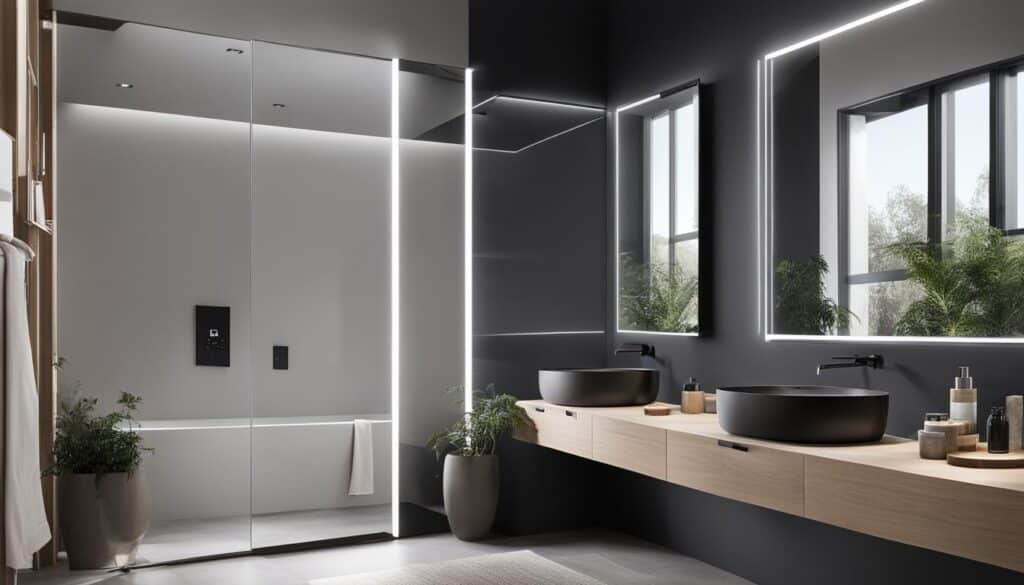
MirroCool is not just an ordinary mirror; it is a smart mirror infused with artificial intelligence. With built-in facial recognition software, MirroCool serves as your personal assistant, providing you with a fully immersive experience. It can remind you of appointments, meetings, and weather forecasts, ensuring you never miss an important event. MirroCool seamlessly integrates with the rest of your smart home ecosystem, allowing you to control other connected devices right from your reflection.
2. Robotic Chef Assistant: Samsung “Bot Chef”
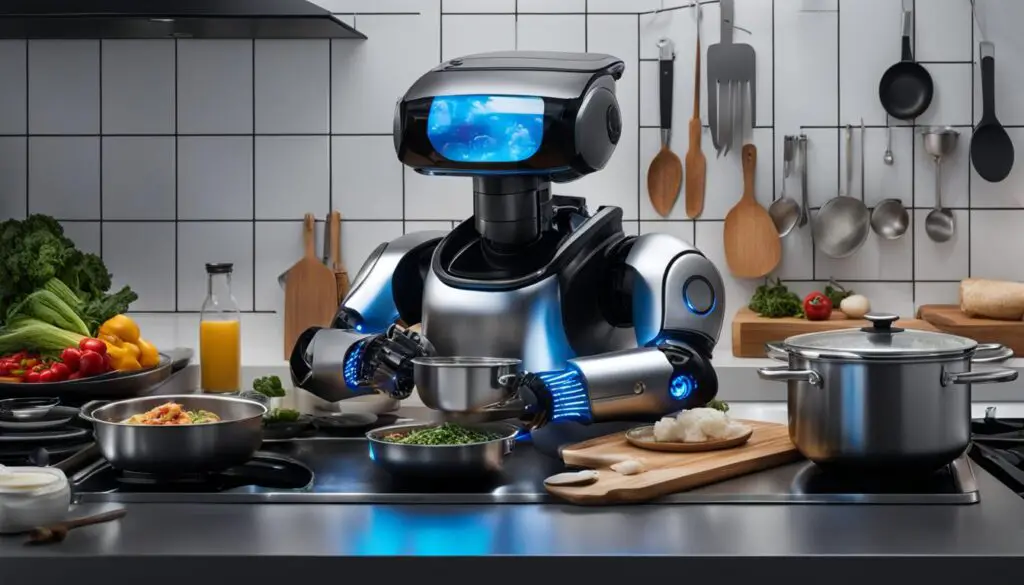
Samsung has taken home automation to a whole new level with their innovative robotic chef assistant, fondly known as “Bot Chef.” Equipped with human-like arms and advanced AI algorithms, Bot Chef can effortlessly perform complex kitchen tasks such as slicing, stirring, and even plating. Simply give voice commands, and Bot Chef will skillfully prepare your favorite recipes, making cooking a truly hands-free experience.
3. Smart Controller for Pets and Plants: KAI
KAI is a groundbreaking device that caters to the well-being of your furry friends and beloved plants. This intelligent smart controller integrates data from biologists and veterinarians to create the perfect environment for animals and plants. KAI monitors and regulates factors such as temperature, humidity, and light intensity, ensuring optimal conditions for your pets and plants to thrive. By providing valuable insights and automated care, KAI simplifies the task of pet and plant maintenance, giving you peace of mind.
These remarkable AI-powered home automation technologies not only make our lives more convenient but also open the door to limitless possibilities in creating smart, interconnected homes of the future. With AI as our companion, we are witnessing a paradigm shift in the way we interact with our living environments.
The Rise of AI in Smart Homes
AI is revolutionizing smart homes, bringing a new level of convenience, efficiency, and connectivity. With the advent of AI-enabled devices, homeowners can experience a seamless integration of cutting-edge technology into their daily lives.
One of the key ways AI is transforming smart homes is through voice-activated assistants. These intelligent virtual companions, such as Amazon’s Alexa or Google Assistant, can control various aspects of the home with simple voice commands. From adjusting the thermostat to dimming the lights, AI-powered assistants provide a hands-free and intuitive way to manage smart home devices.
Smart appliances equipped with AI capabilities are also gaining traction in the market. These devices can learn and adapt to user preferences, optimizing energy usage and enhancing efficiency. For example, smart thermostats utilize AI algorithms to automatically adjust the temperature based on occupancy patterns, reducing energy wastage and providing cost savings.
AI’s impact on home security is particularly noteworthy. With AI-powered security cameras, homeowners can enjoy proactive monitoring and instant alerts, ensuring their properties and loved ones are protected. These cameras employ advanced computer vision algorithms to detect potential threats or suspicious activities, giving homeowners peace of mind both at home and when away.
“AI is driving the transformation of smart homes into ‘genius homes,’ where every aspect of our living spaces is seamlessly interconnected and intelligently controlled.”
The future possibilities for AI-enabled smart homes are vast. Imagine an intuitive home automation system that knows your routines and preferences, adjusting lighting, temperature, and entertainment options accordingly. Picture personalized AI companions that not only greet you at the door but also handle tasks such as managing your calendar or recommending recipes. The potential for predictive algorithms that anticipate residents’ needs, optimizing comfort and convenience, is also within reach.
As AI continues to evolve and become more sophisticated, smart homes will become increasingly efficient, convenient, and interconnected. The rise of AI in smart homes is transforming the way we live, enhancing our daily lives in ways unimaginable just a few years ago.
Conclusion
AI has become the driving force behind smarter homes, redefining the way we live and control our living spaces. With AI, smart homes offer unprecedented levels of convenience, efficiency, and peace of mind. The integration of AI with smart devices is continually evolving, paving the way for even smarter and more interconnected homes.
As AI technology advances, the future of smart home automation looks promising. With ongoing developments, we can expect homes to become even more intelligent and responsive to our needs. Imagine a home that learns your preferences and adjusts lighting, temperature, and entertainment accordingly, making personalized recommendations tailored to your lifestyle.
Embracing AI in our homes allows us to redefine luxury and experience a life where technology meets our needs with elegance and intelligence. As AI becomes more prevalent in smart homes, it will enhance our daily routines and provide greater convenience. From voice-activated assistants to predictive algorithms that anticipate our needs, the possibilities are limitless.
The future of smart home automation lies in the hands of AI. As we move forward, we can expect AI-powered smart homes to continue transforming the way we live, making our lives more comfortable, efficient, and connected. Get ready for a future where every aspect of your home is intelligently controlled, creating a seamless and immersive living experience.
FAQ
What is smart home technology?
Smart home technology refers to a group of appliances that operate independently and can be controlled remotely through a shared network.
What are the advantages of AI-powered smart home automation?
AI-powered smart home automation has several advantages, including improved smart access control and home security through biometric authentication techniques. It also saves energy and increases overall energy efficiency by adapting settings in real time. Additionally, AI enhances user experience by creating personalized automation routines and integrating smart home appliances for a seamless and convenient living experience.
How does AI impact the smart home landscape?
The integration of AI with smart products is driving the rapid growth of the global smart home automation market. AI enables customized automation routines based on user preferences, optimizing energy usage, and anticipating residents’ needs. The integration of AI with smart home appliances reflects the current trend of technology giants and important sectors.
What are some unique AI-powered home automation technologies?
MirroCool is a smart mirror that serves as a personal assistant with features like facial recognition software and reminders for appointments, meetings, and weather forecasts. Samsung’s Chef’s assistant robot “Bot Chef” has human-like arms and can perform tasks like slicing and stirring in response to voice commands. KAI is a revolutionary device that creates a perfect environment for animals and plants, integrating data from biologists and veterinarians. These technologies highlight the potential of AI in home automation.
How is AI revolutionizing smart homes?
AI is revolutionizing smart homes by bringing a new level of convenience, efficiency, and connectivity. AI technology enables voice-activated assistants to control various aspects of the home, while smart appliances learn and adapt to user preferences, optimizing energy usage. AI-powered security cameras provide proactive monitoring and instant alerts, enhancing home security. The future possibilities for AI-enabled smart homes include intuitive home automation systems, personalized AI companions, and predictive algorithms that anticipate residents’ needs.




